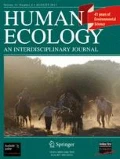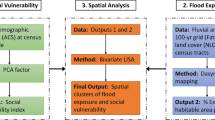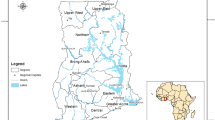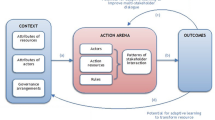Abstract
Variability in environmental phenomena such as fire, flooding, and weather-related events can have significant impacts for social and environmental systems and their coupled interactions. Livelihoods systems reliant on the natural environment can be disrupted or eliminated, while associated governance regimes require negotiation to ensure equitable and sustainable management responses. These patterns can be particularly pronounced within areas prone to flooding, as these sites can experience variability in the location, timing, amount, and duration of flooding events. While research within the social and natural sciences has evaluated these dynamics within flooding regimes, the coupled interactions can be underemphasized even though they are integral in producing livelihood systems and possibilities for environmental management. This paper details research conducted from 2011 to 2016 in five villages located in different locations within the Okavango Delta of Botswana. We report the findings from qualitative interviewing and livelihood mapping activities that are integrated with remote sensing analysis to provide concrete empirical detail on the variability of flooding and resulting variations in perception and livelihood responses. The paper demonstrates that flooding dynamics vary at discrete locations and produce diverse perceptions that are tied to livelihood adjustments in place-specific ways. These patterns are also embedded in regional and global processes that have significant implications for household vulnerability within socio-ecological systems strongly impacted by local and distant climatic and hydrological drivers of change.

Similar content being viewed by others
Notes
Specific dates of input images (across four different tiles): A) Landsat 5 TM 1998: May 22 & 31; June 2 & 23; July 4, 11, 18, & 27; and August 3, 10, 12, 19, 21, 26, & 28; B) Landsat 7 ETM+ 2011: May 2, 4, 11, 18, & 27; June 3, 12, 14, 23, & 30; July 16, 25, & 30; and August 1, 8, 15, 17, 22, 24, & 26; and C) Landsat 7 ETM+ 2012: June 9, 14, 23, 25, & 30.
References
Abbott, J. G., and Campbell, L. M. (2009). Environmental Histories and Emerging Fisheries Management of the Upper Zambezi River floodplains. Conservation and Society 7(2): 83–99. https://doi.org/10.4103/0972-4923.58641.
Asah, S. T., Nelson, K. C., and Bengston, D. N. (2008). Managing Social-Ecological Change and Uncertainty: Floodplain Agriculture and Conservation in Dryland Northern Cameroon. Conservation and Society 6(2): 166–178. https://doi.org/10.4103/0972-4923.49210.
Bakker, K. (2012). Water Security: Research Challenges and Opportunities. Science 337(6097): 914–915. https://doi.org/10.1126/science.1226337.
Barnaud, C., and Antona, M. (2014). Deconstructing Ecosystem Services: Uncertainties and Controversies Around a Socially Constructed Concept. Geoforum 56: 113–123. https://doi.org/10.1016/j.geoforum.2014.07.003.
Bauch, C. T., Sigdel, R., Pharaon, J., and Anand, M. (2016). Early Warning Signals of Regime Shifts in Coupled Human–Environment Systems, Proceedings of the National Academy of Sciences, p. 201604978. https://doi.org/10.1073/pnas.1604978113.
Beck, L., and Bernauer, T. (2011). How will Combined Changes in Water Demand and Climate Affect Water Availability in the Zambezi River Basin? Global Environmental Change 21(3): 1061–1072. https://doi.org/10.1016/j.gloenvcha.2011.04.001.
Brisbois, M. C., and de Loë, R. C. (2016). State Roles and Motivations in Collaborative Approaches to Water Governance: A Power Theory-Based Analysis. Geoforum 74: 202–212. https://doi.org/10.1016/j.geoforum.2016.06.012.
Chan, N. W., Roy, R., and Chaffin, B. C. (2016). Water Governance in Bangladesh: An Evaluation of Institutional and Political Context. Water 8(403): 1–18. https://doi.org/10.1016/j.geoforum.2016.06.012.
Conca, K. (2015). Which Risks Get Managed? Addressing Climate Effects in the Context of Evolving Water-Governance Institutions. Water Alternatives 8(3): 301–316.
Cox, M., Villamayor-Tomas, S., Epstein, G., Evans, L., Ban, N. C., Fleischman, F., Nenadovic, M., and Garcia-Lopez, G. (2016). Synthesizing Theories of Natural Resource Management and Governance. Global Environmental Change 39: 45–56. https://doi.org/10.1016/j.gloenvcha.2016.04.011.
Danniell, K. A., and Barreteau, O. (2004). Water Governance Across Competing Scales: Coupling Land and Water Management. Journal of Hydrology 519: 2367–2380. https://doi.org/10.1016/j.jhydrol.2014.10.055.
Di Baldassarre, G., Kooy, M., Kemerink, J. S., and Brandimarte, L. (2013). Towards Understanding the Dynamic Behaviour of Floodplains as Human-Water Systems. Hydrology and Earth System Sciences 17(8): 3235. https://doi.org/10.5194/hess-17-3235-2013.
Ellery, W. N., Dahlberg, A. C., Strydom, R., Neal, M. J., and Jackson, J. (2003). Diversion of Water Flow from a Floodplain Wetland Stream: An analysis of Geomorphological Setting and Hydrological and Ecological Consequences. Journal of Environmental Management 68: 51–71.
Feitselson, E., and Fischhendler, I. (2009). Spaces of Water Governance: The Case of Israel and its Neighbors. Annals of the Association of American Geographers 99(4): 728–745. https://doi.org/10.1080/00045600903066524.
Foerster, A. (2011). Developing Purposeful and Adaptive Institutions for Effective Environmental Water Governance. Water Resources Management 25: 4005–4018. https://doi.org/10.1007/s11269-011-9879-x.
Galafassi, D., Daw, T., Munyi, L., Brown, K., Barnaud, C., and Fazey, I. (2017). Learning About Social-Ecological Trade-Offs. Ecology and Society 22(1): 2. https://doi.org/10.5751/ES-08920-220102.
Gaughan, A. E., and Waylen, P. R. (2012). Spatial and Temporal Precipitation Variability in the Okavango–Kwando–Zambezi Catchment, Southern Africa. Journal of Arid Environments 82: 19–30. https://doi.org/10.1016/j.jaridenv.2012.02.007.
Girard, C., Pulido-Velazquez, M., Rinaudo, J. D., Pagé, C., and Caballero, Y. (2015). Integrating Top-Down and Bottom-Up Approaches to Design Global Change Adaptation at the River Basin Scale. Global Environmental Change 34: 132–146. https://doi.org/10.1016/j.gloenvcha.2015.07.002.
Grecksch, K. (2015). Adaptive Capacity and Water Governance in the Kesikamma River Catchment, Eastern Cape Province, South Africa. Water SA 41(3): 359–368. https://doi.org/10.4314/wsa.v41i3.07.
Gupta, J., and Pahl-Wostl, C. (2013). Global Water Governance in the Context of Global and Multilevel Governance: Its Need, Form, and Challenges. Ecology and Society 18(4): 53. https://doi.org/10.5751/ES-05952-180453.
Hastings, A. (2016). Timescales and the Management of Ecological Systems. Proceedings of the National Academy of Sciences 113: 14568–14573. https://doi.org/10.1073/pnas.1604974113.
Hastings, A., and Wysham, D. B. (2010). Regime Shifts in Ecological Systems Can Occur with No Warning. Ecology Letters 13: 464–472. https://doi.org/10.1111/j.1461-0248.2010.01439.x.
Hill, M., and Engle, N. L. (2013). Adaptive Capacity: Tensions Across Scales. Environmental Policy and Governance 23: 177–192. https://doi.org/10.1002/eet.1610.
Hooli, L. J. (2016). Resilience of the Poorest: Coping Strategies and Indigenous Knowledge of Living with the Floods in Northern Namibia. Regional Environmental Change 16: 695–707. https://doi.org/10.1007/s10113-015-0782-5.
Huitema, D., Mostert, E., Egas, W., Moellenkamp, S., Pahl-Wostl, C., and Yalcin, R. (2009). Adaptive Water Governance: Assessing the Institutional Prescriptions of Adaptive (co-) Management from a Governance Perspective and Defining a Research Agenda. Ecology and Society 14(1): 26.
IPCC (2007). Climate Change 2007: The Physical Science Basis. Contribution of Working Group I to the Fourth Assessment Report of the Intergovernmental Panel on Climate Change. In Solomon, S., D. Qin, M. Manning, Z. Chen, M. Marquis, K.B. Averyt, M. Tignor and H.L. Miller (eds.), Cambridge University Press, Cambridge.
IPCC (2014). Summary for policymakers. In Stocker, T. F., Qin, D., Plattner, G.-K., Tignor, M., Allen, S. K., Boschung, J., Nauels, A., Xia, Y., Bex, V., and Midgley, P. M. (eds.), Climate Change 2013: The Physical Science Basis. Contribution of Working Group I to the Fifth Assessment Report of the Intergovernmental Panel on Climate Change, Cambridge University Press, Cambridge.
King, B. (2011). Spatialising Livelihoods: Resource Access and Livelihood Spaces in South Africa. Transactions of the Institute of British Geographers 36(2): 297–313.
King, B., J.E. Shinn, K.A. Crews, and K.R. Young. (2016). Fluid Waters and Rigid Livelihoods in the Okavango Delta of Botswana. Land 5(2) :16
Kull, C. A., de Sartre, X. A., and Castro-Larrañaga, M. (2015). The Political Ecology of Ecosystem Services. Geoforum 61: 122–134. https://doi.org/10.1016/j.geoforum.2015.03.004.
Lade, S. J., Haider, L. J., Engström, G., and Schlüter, M. (2017). Resilience Offers Escape from Trapped Thinking on Poverty Alleviation. Science Advances 3(5): e1603043. https://doi.org/10.1126/sciadv.1603043.
Leauthaud, C., Duvail, S., Hamerlynck, O., Paul, J. L., Cochet, H., Nyunja, J., Albergel, J., and Grünberger, O. (2013). Floods and Livelihoods: The Impact of Changing Water Resources on Wetland Agro-ecological Production Systems in the Tana River Delta, Kenya. Global Environmental Change 23: 252–263. https://doi.org/10.1016/j.gloenvcha.2012.09.003.
Lemos, M. C., and Agrawal, A. (2006). Environmental Governance. Annual Review of Environmental Resources 31: 297–325. https://doi.org/10.1146/annurev.energy.31.042605.135621.
Liu, C., Golding, D., and Gong, G. (2008). Farmers’ Coping Response to the Low Flows in the Lower Yellow River: A Case Study of Temporal Dimensions of Vulnerability. Global Environmental Change 18: 543–553. https://doi.org/10.1016/j.gloenvcha.2008.09.002.
Magole, L., and Thapelo, K. (2005). The Impact of Extreme Flooding of the Okavango River on the Livelihood of the molapo Farming Community of Tubu village, Ngamiland Sub-district, Botswana. Botswana Notes and Records 37: 125–137.
Marcus, R. R. (2007). Where Community-Based Water Resource Management has Gone Too Far: Poverty and Disempowerment in Southern Madagascar. Conservation and Society 5(2): 202–231.
Mbaiwa, J. E., Ngwenya, B. N., and Kgathi, D. L. (2008). Contending with Unequal and Privileged Access to Natural Resources and Land in the Okavango Delta, Botswana. Singapore Journal of Tropical Geography 29: 155–172. https://doi.org/10.1111/j.1467-9493.2008.00332.x.
McCarthy, T. S., Cooper, G. R. J., Tyson, P. D., and Ellery, W. N. (2000). Seasonal Flooding in the Okavango Delta, Botswana – Recent History and Future Prospects. South African Journal of Science 96: 25–33.
Meganck, R. A., and Saunier, R. E. (2014). A Case Study in the Architecture of Global Water Governance. Environment and Natural Resources Research 4(4): 28–36. https://doi.org/10.5539/enrr.v4n4p28.
Meyer, T., and Bendsen, H. (2003). The dynamics of land use systems in Ngamiland: Changing livelihood options and strategies. In Bernard, T., Mosepele, K., and Ramberg, L. (eds.), Environmental Monitoring of Tropical and Subtropical Wetlands, HOORC Report Series No. 1, Maun, pp. 278–307.
Midekisa, A., Holl, F., Savory, D. J., Andrade-Pacheco, R., Gething, P. W., Bennett, A., and Sturrock, H. J. W. (2017). Mapping Land Cover Change Over Continental Africa Using Landsat and Google Earth Engine Cloud Computing. PLOS ONE 12(9): e0184926. https://doi.org/10.1371/journal.pone.0184926.
Millington, A., and Jepson, W. (eds.) (2008). Land-Change Science in the Tropics: Changing Agricultural Landscapes, Springer, NY.
Molle, F., and Mamanpoush, A. (2012). Scale, Governance and the Management of River Basins: A Case Study from Central Iran. Geoforum 43: 285–294. https://doi.org/10.1016/j.geoforum.2011.08.004.
Murray-Hudson, M., Wolski, P., and Ringrose, S. (2006). Scenarios of the Impact of Local and Upstream Changes in Climate and Water Use on Hydro-ecology in the Okavango Delta, Botswana. Journal of Hydrology 331: 73–84. https://doi.org/10.1016/j.jhydrol.2006.04.041.
Murray-Hudson, M., Wolski, P., Cassidy, L., Brown, M. T., Thito, K., Kashe, K., and Mosimanyana, E. (2015). Remote Sensing-Derived Hydroperiod as a Predictor of Floodplain Vegetation Composition. Wetlands Ecology and Management 23(4): 603–616. https://doi.org/10.1007/s11273-014-9340-z.
Nelson, D. R., Adger, W. N., and Brown, K. (2007). Adaptation to Environmental Change: Contributions of a Resiliency Framework. Annual Review of Environmental Resources 32: 395–419. https://doi.org/10.1146/annurev.energy.32.051807.090348.
Niang, I., Ruppel, O. C., Abdrabo, M. A., Essel, A., Lennard, C., Padgham, J., and Urquhart, P. (2014). Africa. In Barros, V. R., Field, C. B., Dokken, D. J., Mastrandrea, M. D., Mach, K. J., Bilir, T. E., Chatterjee, M., Ebi, K. L., Estrada, Y. O., Genova, R. C., Girma, B., Kissel, E. S., Levy, A. N., MacCracken, S., Mastrandrea, P. R., and White, L. L. (eds.), Climate Change 2014: Impacts, Adaptation, and Vulnerability. Part B: Regional Aspects. Contribution of Working Group II to the Fifth Assessment Report of the Intergovernmental Panel on Climate Change, Cambridge University Press, Cambridge.
Ostrom, E. (2008). Frameworks and Theories of Environmental Change. Global Environmental Change 18: 249–252. https://doi.org/10.1016/j.gloenvcha.2008.01.001.
Ostrom, E. (2009). A General Framework for Analyzing Sustainability of Social-Ecological Systems. Science 325: 419–422. https://doi.org/10.1126/science.1172133.
Ozesmi, S. L., and Bauer, M. E. (2002). Satellite Remote Sensing of Wetlands. Wetlands Ecology and Management 10(5): 381–402.
Pahl-Wostl, C. (2007). Transitions Towards Adaptive Management of Water Facing Climate and Global Change. Water Resources Management 21(1): 49–62. https://doi.org/10.1007/s11269-006-9040-4.
Pahl-Wostl, C. (2009). A Conceptual Framework for Analyzing Adaptive Capacity and multi-Level Learning Processes in Resource Governance Regimes. Global Environmental Change 19: 354–365. https://doi.org/10.1016/j.gloenvcha.2009.06.001.
Raadgever, G. T., Mostert, E., Kranz, N., Interwies, E., and Timmerman, J. G. (2008). Assessing Management Regimes in Transboundary River Basins: Do they Support Adaptive Management? Ecology and Society 13(1): 14.
Ramankutty, N., and Coomes, O. T. (2016). Land-Use Regime Shifts: An Analytical Framework and Agenda for Future Land-Use Research. Ecology and Society 21(1). https://doi.org/10.5751/ES-08370-210201.
Shinn, J. E. (2016). Adaptive Environmental Governance of Changing Social-Ecological Systems: Empirical Insights from the Okavango Delta, Botswana. Global Environmental Change 40: 50–59. https://doi.org/10.1016/j.gloenvcha.2016.06.011.
Shinn, J. E., King, B., Young, K. R., and Crews, K. A. (2014). Variable Adaptations: Micro-politics of Environmental Displacement in the Okavango Delta, Botswana. Geoforum 57: 21–29.
Thito, K., Wolski, P., and Murray-Hudson, M. (2016). Mapping Inundation Extent, Frequency and Duration in the Okavango Delta from 2001 to 2012. African Journal of Aquatic Science 41(3): 267–277. https://doi.org/10.2989/16085914.2016.1173009.
Weinzierl, T., Wehberg, J., Böhner, J., and Conrad, O. (2016). Spatial Assessment of Land Degradation Risk for the Okavango River Catchment, Southern Africa. Land Degradation & Development 27: 281–294. https://doi.org/10.1002/ldr.2426.
Winterbach, H. E., Winterbach, C. W., and Somers, M. J. (2014). Landscape Suitability in Botswana for the Conservation of its Six Large African Carnivores. PLOS ONE 9(6): e100202.
Winterbach, C. W., Whitesell, C., and Somers, M. J. (2015). Wildlife Abundance and Diversity as Indicators of Tourism Potential in Northern Botswana. PLOS ONE 10(8): e0135595. https://doi.org/10.1371/journal.pone.0135595.
Wolski, P., Todd, M. C., Murray-Hudson, M. A., and Tadross, M. (2012). Multidecadal Variability in Hydro-climate of Okavango River System, Southwest Africa, in the Past and Under Changing Climate. Journal of Hydrology 475. https://doi.org/10.1016/j.jhydrol.2012.10.018.
Wolski, P., Murray-Hudson, M., Thito, K., and Cassidy, L. (2017). Keeping it Simple: Monitoring Flood Extent in Large Data-Poor Wetlands Using MODIS SWIR Data. International Journal of Applied Earth Observation and Geoinformation 57: 224–234. https://doi.org/10.1016/j.jag.2017.01.005.
Young, O. R. (2011). Effectiveness of International Environmental Regimes: Existing Knowledge, Cutting-Edge Themes, and Research Strategies. Proceedings of the National Academy of Sciences 108(50): 19853–19860. https://doi.org/10.1073/pnas.1111690108.
Yurco, K., B. King, K.R. Young, and K.A. Crews. (2017). Human-Wildlife Interactions and Environmental Dynamics in the Okavango Delta, Botswana. Society & Natural Resources 30(9): 1112–1126.
Acknowledgements
This research was supported by the United States National Science Foundation (BCS/GSS-0964596) andBCS/GSS Research Experiences for Undergraduates (REU) Supplement Award. The work was also supported by grant, P2CHD042849 awarded to the Population Research Center at The University of Texasat Austin by the Eunice Kennedy Shriver National Institute of Child Health and Human Development. The content is solely the responsibility of the authors and does not necessarily represent the official views of the National Institutes of Health. Fuata John, Japhet John, and Kentse Madise were invaluable as our research assistants. Allison White and Evan Griffin helped conduct the qualitative interviews in the Etsha region in 2011, and Amelia C. Eisenhart contributed to the remote sensing analysis that informed Figure 1. We are especially appreciative of our many informants for their time and generous insights.
Author information
Authors and Affiliations
Corresponding author
Ethics declarations
Conflict of Interest
The authors declare that they have no conflict of interest.
Additional information
Publisher’s Note
Springer Nature remains neutral with regard to jurisdictional claims in published maps and institutional affiliations.
Rights and permissions
About this article
Cite this article
King, B., Yurco, K., Young, K.R. et al. Livelihood Dynamics Across a Variable Flooding Regime. Hum Ecol 46, 865–874 (2018). https://doi.org/10.1007/s10745-018-0039-2
Published:
Issue Date:
DOI: https://doi.org/10.1007/s10745-018-0039-2




